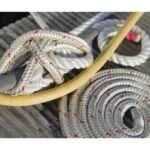Everyone know’s Murphy’s Law: that which can go wrong, will go wrong. Unsurprisingly, this maxim applies even more to yachting than it does to on-shore living. A boat is not only a work of art, but an incredibly complex machine that unfortunately has a tendency to fail when you lest expect it. However, learning about your craft as you maintain it and the satisfaction that comes from fixing your boat are worth the headaches.
In the two months that I’ve lived onboard a yacht, a myriad of issues have arisen and subsequently been dealt with. First, a joint in between a master head and the holding tank broke (a time-consuming fix), through which I learned about on-board plumbing. Last weekend, another boat I happened to be on had a generator that wouldn’t start. Through using the manual, and flipping lots of random switches, I and others fixed the problem. Unfortunately, this had the side effect of shutting off power to the radio (and all of this took place while underway). Another manual session and 20 minutes later, the radio was up and running.
Every maintenance situation on a boat is a learning opportunity. There’s no telling when you might face an issue again, or if your knowledge might enable you to help someone else. That’s why I approach every mechanical, electrical, or otherwise boat-related problem as a way to learn more about how boats work, and what I can do to keep them working correctly. Boat problems can be the worst kind, but only if you don’t look at them as a way to learn more about your vessel and how she works.





